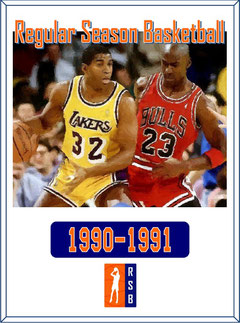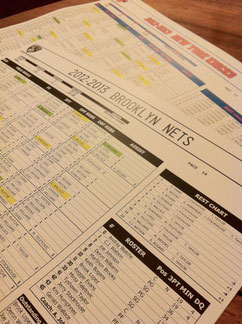Air Jordan NBA

NBA 1990-‘91: 27 teams
Season Recap: FIRST MJ TITLE
Michael Jordan had won four straight NBA scoring titles by the time the 1990-91 season began, and his vast array of endorsements had made him a household name. But, he was dogged by the Wilt Chamberlain syndrome.
Every sports fan with even a passing familiarity with the NBA would quote how no team with the scoring champ had won a title since Kareem Abdul-Jabbar and the Bucks pulled off the feat in 1971.
Jordan had been the NBA's Rookie of the Year in 1985, had been named to the All-NBA First Team four straight years and had even been named to the NBA All-Defensive First Team three straight times. But Jordan's Bulls couldn't seem to get by Detroit, having lost to the Pistons in the Eastern Conference finals each of the past two postseasons.
But the Bulls had made drastic changes since Jordan's rookie year. John Paxson was signed as a free agent in 1985. Horace Grant and Scottie Pippen were added in the 1987 Draft and cetner Bill Cartwright was acquired for Charles Oakley in 1988. Finally, B.J. Armstrong was selected in the 1989 NBA Draft. By 1990, the Bulls were ready to supplant the Pistons.
Chicago won a franchise-record and NBA-best 61 games, blowing through New York, Philadelphia and their nemesis, Detroit, on the way to the NBA Finals.
Out West, the Lakers became a defensive unit under new coach Mike Dunleavy, moved past Houston, Golden State and Portland to advance to The Finals.
The 1991 NBA Finals was billed as a matchup between two larger-than-life superstars -- Jordan and Johnson. But as the series played out, it became obvious that it took a team, not one superlative individual, to win an NBA title.
Jordan was superb, as his series averages of 31.2 points, 11.4 assists and 6.6 rebounds demonstrated, but the Bulls were no one-man team. Their defense held the Lakers to a record-low 458 points for a five-game series. Jordan, who had won his fifth straight scoring title in April, had finally silenced those who said he couldn't lead the Bulls all the way.
"I never thought I'd be this emotional," said Jordan, who cried and repeatedly hugged the NBA's Championship trophy. "I've never been this emotional publicly."
Before the season, the Orlando Magic went from the Central Division in their inaugural season (1989-90) to the Western Conference's Midwest Division. Still, the Magic improved by 13 wins and saw its star guard, Scott Skiles, set an NBA record for assists in a game (30) on Dec. 30, 1990, against Denver.
The Phoenix Suns set a record, too, scoring 107 first-half points against the Nuggets on Nov. 10, 1990. It was a remarkable feat considering the Suns had set the mark three days earlier in a game against the Spurs.
(Source NBA.com)
TO BUY THIS SEASON: ONLY 18 $ FOR ALL THE 27 TEAMS!
ADVANCED RULES INCLUDED.
WITH NEW TEAM CHARTS TEMPLATE!

NBA 1995-‘96: 29 teams
Season Recap: HISTORICAL SEASON
After hearing for an entire offseason that he wasn't quite the same player as he had been when he abruptly retired in 1993, Michael Jordan was driven to lead the Bulls to the NBA championship for the fourth time in six years. His supporting cast included Scottie Pippen and Dennis Rodman, acquired in a preseason trade. Though a talented collection of players, no one could have predicted what the team would accomplish.
Also other events helped the Bulls run to happen: the league expands to 29 teams with Toronto and Vancouver, two franchises from Canada; the draft was not a memorable one with only a few players of immediate impact (Joe Smith, R. Wallace, Stackhouse and McDyess) and others with future (Garnett, Finley); the 3-point line was shortened to near the college level in an attempt to help offensive players score more, with the unconventional result to give another big weapon to perimetral teams and increasing the 3pt attempts of 12%.
During the regular season, the Bulls lose to Seattle to fall to 10-2 in late November, then the team won 31 of its next 32 games, including 14 during an undefeated January. Although they lost back-to-back games at Denver and Phoenix to avoid becoming the first team in NBA history to play an entire season without consecutive losses, their failures were few and far between.
They were nearly invincible at home, going 37-0 (extending their home winning streak to 44) before losing to the Charlotte Hornets on April 8. At Milwaukee, on April 16, they achieved what many experts never thought possible - 70 wins - with a 86-80 decision over the Bucks. They finished 72-10, breaking the 69-13 record of the 1971-72 Los Angeles Lakers. Only the Indiana Pacers were able to beat the Bulls twice.
In doing so, the Bulls won many of the postseason awards: Jordan was named the league's Most Valuable Player and was the All-Star Game MVP. He led the league in scoring (30.4 ppg) ranked third in steals (2.20 spg), and 11th in three-point field-goal percentage (43%). Pippen, long regarded as perhaps the best all-around player in the NBA, averaged 19.4 ppg, 6.4 rpg and 5.9 apg, and finished 12th in the NBA in steals. Rodman, who added an element of intrigue with his unique antics and unparalled rebounding ability, led the league in rebounds (14.9 rpg). Rodman, Jordan and Pippen were all named to the league's All-Defensive Team. Toni Kukoc won the NBA Sixth Man Award, and the supporting cast included Steve Kerr (second in three-point field goal percentage), Luc Longley (9.1 ppg) and Ron Harper (7.4 ppg).
In the playoffs, the Bulls kept rolling, losing only one playoff game in series wins over Miami, New York and the surging Orlando Magic of Shaquille O'Neal. In the Finals, the Bulls beat the Sonics of Kemp and Payton, in six games, finishing with a postseason record of 15-3, and an overall record of 87-13, the best in NBA history. Jordan was named the Finals MVP for the fourth time as he cemented his legend in the Windy City and in NBA annals.
(Source SR)
TO BUY THIS SEASON: ONLY 18 $ FOR ALL THE 29 TEAMS!
ADVANCED RULES INCLUDED.
WITH NEW TEAM CHARTS TEMPLATE!
You can do it, too! Sign up for free now at https://www.jimdo.com





